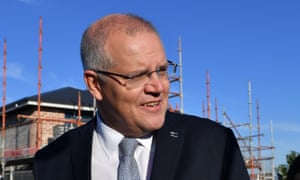The announcement was a ‘who knows’ policy and yet the ALP jumped in to match it. Why? Because politics
Nothing
demonstrates how election campaigns are often a triumph of politics
over policy than that two days after the Reserve Bank signalled the
economy is set to grow slower than expected, the Liberal party announced
a policy to assist some first-home buyers with a deposit guarantee and
the ALP matched it two hours later.
It should not be a surprise that such a housing policy would be announced by the Liberal party – their primary response to housing affordability has always been to pump the demand rather than supply.
And while it is unlikely this policy will have an impact on prices as the old first-home buyer grants it does have other potential issues.
It does place the government as a guarantor of loans which is fine so
long as the housing market doesn’t crash. It also will see some
homeowners have a very high amount of debt – which again is an issue if
prices fall and you reach a state where the value of the house is worth
more than your loan.It should not be a surprise that such a housing policy would be announced by the Liberal party – their primary response to housing affordability has always been to pump the demand rather than supply.
And while it is unlikely this policy will have an impact on prices as the old first-home buyer grants it does have other potential issues.
All of these eventualities are not happy thoughts, but it is a bit weird to have a government encouraging buyers to open themselves to such risk, especially if the actual lending standards required to take out a loan are not reduced.
UBS research suggested that the program “could add up to around $3bn to loan demand” but as it is “capped at 10,000 loans per annum (or around 10% of first home buyer loans in the last year) and limited to $500m (or around $50,000 per loan)” it is a “tiny, roughly 1%, share of annual total home loans of $227bn”.
Overall they suggest the policy “doesn’t make a material difference to our outlook.”
The policy also screams as being a last minute, “Oh my god we have nothing to announce today at our campaign launch” policy.
After all the policy has not been modelled at all.
Treasurer Josh Frydenberg was asked five times on ABC radio if the government had modelled the policy and the best he came up with was “we’ve been working on this policy for some time, we have been talking to people in the industry”. Because why would a party that had been in government for six years and have access to the entire department of treasury bother to model a policy when you can just “talk to people”?
So it’s not a great policy – though possibly not terrible – but mostly it is a “who knows” policy and yet the ALP jumped in to match it. Why? Because politics.
It was a case of the Liberal party having essentially no major policies other than a flat tax, and so when Scott Morrison announced it on Sunday you could feel the coverage switching to “Ooh the Liberal Party needed to do something, this is something, therefore it is good.”
Matching it does no great harm to the ALP – the entire funding will be “off-budget” (as the loans will be repaid so it is classed as an investment not an expenditure) – and it is an easy one to review later should they win on Saturday and dump it if it seems a dud, or keep it if not.
As it is the housing and finance market is in a slump that certainly does not reflect the statement of Morrison in the Coalition’s campaign launch on Sunday that they had delivered “a stronger economy, where people have the confidence to invest more”.
The latest finance figures released on Monday by the ABS showed over the past year lending to households and businesses have dropped appreciably:
That surprise is heightened by the fact on Friday in its latest statement on monetary policy the Reserve Bank revised down its outlook for GDP growth for 2019 from 2.75% to 2% and for 2019-20 from 2.75% to 2.5%. This contrasts with the Budget’s estimate for average GDP growth for the next financial year of 2.75%.
Damningly the Reserve Bank also revised down estimates for consumption growth because “of weak household disposable income growth over the past few years and weak housing market conditions”.
For a government seeking re-election off the back of its strong management of the economy the Reserve Bank’s outlook is a harsh report card.
It cites weaker than expected GDP growth, a possible weaker outcome for employment due to “the decline in job advertisements”, and also a suggestion that “Chinese growth could be weaker than forecast; in that event, weaker growth in nominal incomes could make it harder to inflate away the existing stock of debt”.
It smacks of the work of a government with few ideas of what to do other than lower tax rates for high income earners and come up with a rinky-dink first-home buyer scheme on the run.
It is clear from the RBA’s statements that whoever wins this Saturday will need to care more about policy than politics.
• Greg Jericho is a Guardian Australia columnist and economics writer

No comments:
Post a Comment